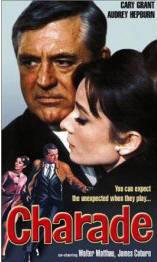|
|
|
 Not a Hitchcock film, though directed in that style by Stanley Donen (Arabesque, Saturn 3, Singin’ In The Rain). Cary Grant is a mysterious stranger in Paris who offers to help widow Audrey Hepburn. A government man (Walter Matthau) tells her in his U.S. Embassy office that her husband and three other men stole a quarter of a million dollars during World War 2 intended for an operation to expose Nazi spies. The government wants it back and thinks she has it. So do the bad guys. One is a grinning killer (James Coburn), the second is an angry psycho who lost his hand to torture and now uses the hook it was replaced with as a weapon (George Kennedy). The third partner in crime just might be Cary Grant, and he does seem to have a relationship of some kind with the first two.
Not a Hitchcock film, though directed in that style by Stanley Donen (Arabesque, Saturn 3, Singin’ In The Rain). Cary Grant is a mysterious stranger in Paris who offers to help widow Audrey Hepburn. A government man (Walter Matthau) tells her in his U.S. Embassy office that her husband and three other men stole a quarter of a million dollars during World War 2 intended for an operation to expose Nazi spies. The government wants it back and thinks she has it. So do the bad guys. One is a grinning killer (James Coburn), the second is an angry psycho who lost his hand to torture and now uses the hook it was replaced with as a weapon (George Kennedy). The third partner in crime just might be Cary Grant, and he does seem to have a relationship of some kind with the first two.
All the while, Matthau updates Hepburn on his investigation of the shadowy Grant and the other two. Twist ending – the $250,000 has been hidden in plain sight, Matthau is not who he pretended to be and neither was Grant, though the two were still on opposing sides. Script by Peter Stone based on his story “The Unsuspecting Wife.” Music by Henry Mancini, filmed on location in Paris. No relation to “Charade” (a 1953 trilogy of love & murder starring James Mason & his wife Pamela). Cary Grant was in Charade just four years after Hitchcock's “North By Northwest,” yet would make just two more movies before retiring with wife Dyan Cannon (they had a child together before divorcing in 1968. Cary died in 1986).
Cary Grant
Cary Grant (real name Archibald Leach) was born in England in 1904. Brought up in poverty, he left home at age 13, working as a song & dance man and occasional juggler. When the group of traveling entertainers he was with reached New York in 1920, he got work as a Coney Island lifeguard. He spent the winters entertaining and walking on stilts carrying advertising signs. In 1923 he returned to England and began doing musical comedies on stage. He was discovered there by Arthur Hammerstein, who hired him for a series of Broadway productions back in New York. In 1932 he went to Hollywood and did a number of musical comedies that year under contract to Paramount including “Blonde Venus” starring Marlene Dietrich. He continued doing several movies per year during the 1930s including the live-action version of “Alice In Wonderland” (1933, dressed as the Mock Turtle, with W.C. Fields as Humpty Dumpty), and was soon established as a straight romantic leading man.
He even played a ghost in “Topper” (1937) and straight man to Peter Lorre & two murderous aunts in “Arsenic And Old Lace” (1944). When critics complained that he always played sophisticated, witty, casual, debonair men at odds with the world, he commented, “I play myself to perfection.” Never one to take himself too seriously, he was once asked in a telegram by his agent, “How old Cary Grant?” for a bio. Cary wired back, “Old Cary Grant fine, how you?” His final movies were “Father Goose” (a WW2 comedy, as the Filthy Beast who falls in love with a prim French teacher marooned on an island), and “Walk, Don’t Run” (1966, a so-so romantic comedy remake of “The More The Merrier” updated to the 1964 Olympics hotel shortage in Tokyo). During divorce proceedings, Dyan Cannon accused him of using LSD and hitting her in front of the servants, and there had been a period when he dabbled in the supernatural with charlatans, but his reputation has survived and he was awrded a lifetime Academy Award in 1970.
Fun fact:
While filming “Roman Holiday” (1953) with Gregory Peck, director William Wyler secretly told Peck to stick his hand in a statue’s mouth – legend had it that the statue would bite the hand off of liars – and pretend it had his hand. He did, and Audrey Hepburn’s reaction was so good they used it in the movie. Hepburn’s final film was Always, Steven Spielberg’s remake of the Spencer Tracy movie “A Guy Named Joe,” with Hepburn as the angel who advises the ghost (Richard Dreyfuss) on how to communicate with his girlfriend, just before she flies a dangerous mission in a WW2 bomber.
© Bill Laidlaw. All Rights Reserved.

|
|